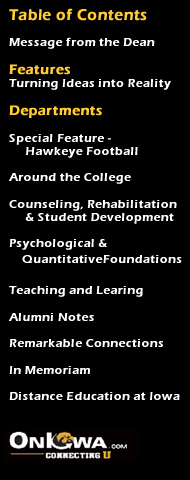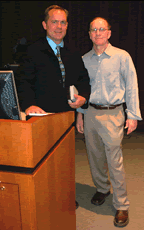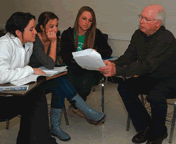
|
|
|
When Mitch Kelly (BA ‘87/MSW ‘91/PhD ’95) walked on to The University of Iowa wrestling team in the 1980s, he met an important mentor in legendary coach Dan Gable. Now, as a clinical associate professor in Educational Psychology, Kelly shares his mentor with his students. “Aside from my family, nobody has had a bigger and more influential impact on my life than Dan Gable,” Kelly said. “He is a person who became the best in the world in his sport and as a coach, so I want to expose my students to his way of thinking.” Kelly has been teaching at the College since 1992. Gable has visited his classes as a guest speaker every semester since then other than one when he was out of the country. Gable said he continues to visit Kelly’s classes because he sees his former athlete making a positive difference as a teacher. “I think he applies a little of the philosophy he learned from his coaches,” he said with a smile. “I think he makes an impact and he wants to bring me in because I made an impact on his life.” Kelly said he always hears from students after the visit. “The students are inspired by his story and his presentation,” he said. One student even emailed Kelly some 10 years after taking his class. Jason Winans (BA ’98), fourth-grade teacher at Binion Elementary in Richland Hills, Texas, wrote: “I remember what a motivated teacher you were and the kindness you showed your students. I especially remember you bringing in Dan Gable to speak to the class. He talked about a framed picture you had given him. It was a picture of the Belmont Stakes in which Secretariat had won the race by a huge margin. The horse had blinders on and Coach Gable explained how we are given the opportunity to succeed, we just need to focus on the goal. I have always remembered that in my career as a teacher. I focus on each child as an individual and try to teach them to be self-motivators and do their best to achieve their goals.” In his most recent visit, Gable described an algebra teacher who reached out to him and reminded Kelly’s students that they’ll have opportunities to reach out to future students as well. “This class has a lot to do with the future of America. You are going to be affecting people in your lives,” he said, adding that he sees good teachers and good coaches employing similar strategies for connecting with their charges. Sophomore Lindsay Bornhoft said, “I’ll always remember Coach Gable’s advice to earn students’ respect.” Kelly said that’s among the many things he’s learned from Gable too. “He believes strongly in treating each student as an individual, building strong relationships based on respect, and he knows the impact one teacher can have on the life of a student,” Kelly said. School Psychology Professor Stewart Ehly’s course, “Home/School/Community: System Intervention” explores interactions between schools, families, and communities. The first time he’s offered it in a decade, he sees it as a supplement to his regularly offered Parent-Teacher Communications course. “It’s about understanding the bigger picture,” Ehly said. “There are so many connections.” As part of the course, students were broken into teams to investigate a particular piece of the puzzle and to understand how it works on a local and national level. Students studied health services, early childhood education, school and business partnerships, social services, and the full service school model. The course, which often featured guest speakers, culminated with students reporting back via an in-class presentation and a formal paper documenting their findings. Jamie Wagner, Christina Torre, and Jessica Halfen researched health services. “We interviewed people who are working with health care within schools around the Iowa City area to see how it benefits the school system and if there are any new developments happening,” Halfen said. “I think this project was useful because it allowed us as future educators to be knowledgeable about what our schools and their communities offer the faculty, students, and their families.”
Torre said she learned through Ehly’s course the importance of teachers understanding their communities. “The more they know and have relationships with members of the community, the more resources will become available,” she said. Wagner said the course will help her in her future work in education. “When people and organizations work together for a common goal—the best interest of the student—great things can happen!” she said. |



